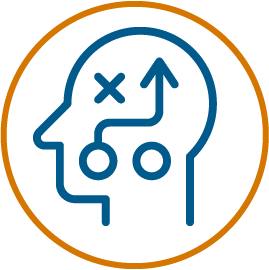Gain the skills to assess and provides services to students with cortical/cerebral visual impairment.
Program Type
Graduate Certificate
Semester Start
Fall
Study Options
Online
Minimum Duration
1.5 Years
UMass Boston’s Cortical/Cerebral Visual Impairment (CVI) Certificate focuses on training professionals to effectively assess and provide needed services to students diagnosed with cortical/cerebral visual impairment. It’s designed for teachers of students with visual impairments, vision rehabilitation therapists, and orientation and mobility specialists who want to understand the visual brain, the brain-based causes and manifestations of CVI, current CVI-specific assessment methods, how to apply assessments for students with CVI, and how to apply current promising practices for the different manifestations of CVI. Explore cutting-edge research, perspectives, and approaches to responding to the needs of students with CVI, and gain practical hands-on experience through fieldwork. Apply these skills to assist students with CVI — working directly with students, their families, school districts, medical professionals, and researchers.
Tuition
- This program consists of five 3-credit courses, or 15 credits.
- Each course is $1,401.
- Total estimated tuition cost to complete this program is $7,005.
- Other fees may apply. Request Info to connect with a program representative for further details.
Deadline
Applications to start in the fall are due by June 15.
Application Checklist
- Online Application
- Transcripts — Official transcripts from all undergraduate and graduate institutions attended. A 3.0 undergraduate GPA is required.
- Three Letters of Recommendation — Use the forms provided by the Office of Graduate Admissions. Emphasis should be on academic and professional references.
- Test Scores: GRE, MAT, or MTEL — If you do not have a master’s degree, you will be required to take the Graduate Record Examination (GRE), Miller Analogies Test (MAT), or Massachusetts Test for Educator Licensure (MTEL). Please contact sgisd@umb.edu with questions regarding eligibility to waive scores.
- Statement of Interest and Intent (Required Writing Sample) — Submit a two-part essay:
- Explain your reasons for wishing to pursue graduate studies (approximately 300 words).
- Indicate your specific interest in Cortical/Cerebral Visual Impairment and discuss the type of work you would like to do in this field (at least 1,200 words).
- This statement will be reviewed for both your overall message and your ability to write at the graduate level. Proofread your writing carefully; it is ranked according to its clarity, grammar, and syntax.
- Personal Interview with Faculty Member — When the Office of Graduate Admissions has notified us of your completed application, we will contact qualified candidates to arrange an interview (either in person or via teleconference).
- International Applicants Only — TOEFL Test Scores
- Visual Processing and the Brain/Neurology (VISN 651)
Develop a firm grasp on the neuroanatomy associated with visual processing, brain development in the context of vision, as well as understand how and where various aspects of functional vision are processed in the brain and how early developmental brain damage may impact these processes. Study motion processing, visual attention, object and face processing, visuomotor integration, and the various visual-perceptual difficulties such as agnosias. You’ll also learn about the principles that govern neuroplasticity and vulnerability; different imaging modalities available to study the brain; what makes a good study and a scientifically valid and reliable assessment; and will understand how developing a common language between educators, clinicians, and parents is imperative for serving children with CVI. - Cortical/Cerebral Visual Impairment (VISN 648)
Get an overview of CVI and resources available for assessment and instructional strategies. Examine and explore the unique educational needs of children with CVI and the skills related to teaching these children in a full array of educational settings — Pre-K through grade 12. You’ll focus on the assessment using the Christine Roman-Lantzy’s CVI Range and the Dutton “Questions to Ask Parents and Caregivers of Children with CVI” for gathering parent information; determining the educational severity of CVI; and setting goals, benchmarks, and environmental and learning accommodations for modifications for IEP development. You’ll study characteristics of and causes of CVI, theories about CVI, assessment using the CVI Range, conducting parent interviews (Roman, Dutton, Oribus), teaching strategies that will apply in the core and expanded core curriculums, such as literacy, self care, career-vocational skills, visual efficiency, and compensatory strategies. You’ll also study specific material modifications and accommodations. - Assessment of Students with CVI (VISN 652)
Develop an understanding that the traditional ocular functional vision assessments do not accurately and completely assess the visual processing and visual recognition difficulties of the child with brain based visual impairment. Study concepts including the limitations of clinical vision functional testing and the need for functional vision testing by licensed TVIs and O&M professionals. Demonstrate your ability to interpret ophthalmology, low vision, and neurology reports. Learn to effectively perform CVI functional vision assessments and Learning Media Assessments with the consideration that neuroplasticity can lead to visual improvements and that each child needs a unique consideration of all skills and abilities. - Promising Practices/Methods of Teaching Students with CVI (VISN 653)
Use assessment results to craft appropriate materials, environments, and programming for your students with CVI based on their unique profiles. You’ll study reporting writing, IEP development, service delivery, the adaptation of learning environments and materials, and instructional strategies based on the visual behaviors of each child with CVI. - Consultation and Collaboration for Students with CVI (VISN 654)
Develop an understanding of the knowledge and skills necessary for collaborative consultation and technical assistance to parents, school-based teams and medical professionals of learners with a diagnosis of CVI. Explore collaboration strategies for effective information sharing with parents, teams and medical professionals.
At the end of this year-and-a-half program, you’ll be awarded a Certificate in Cortical/Cerebral Visual Impairment. The certificate will demonstrate your expertise in the field on your résumé, as well as in interviews and workplace evaluations. Upon completion of the program, you will be prepared to enhance your practice as a teacher of students with visual impairments, an orientation and mobility specialist, or a vision rehabilitation therapist to effectively assess and provide services to students with CVI.
Why UMass Boston Online?
Value
Among the lowest online tuition rates of an accredited, public research university.
Flexibility
Study full-time to finish fast, or part-time to suit your schedule. Live sessions scheduled with the working professional in mind.
Authenticity
The same courses taught by the same academic departments as on campus. No third-party providers.
Learn More






